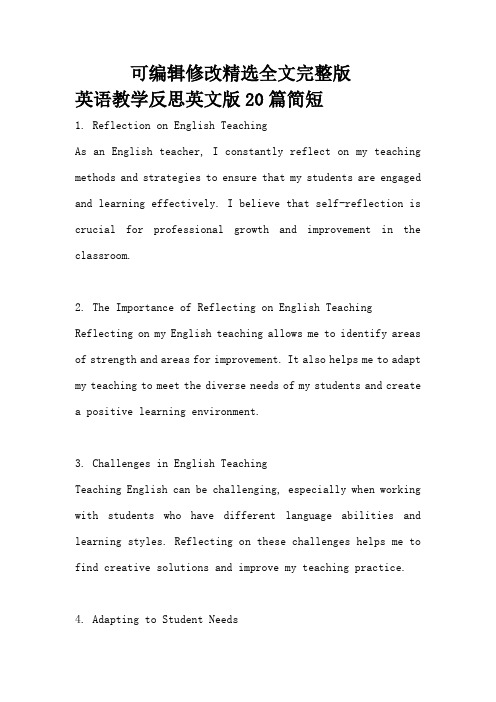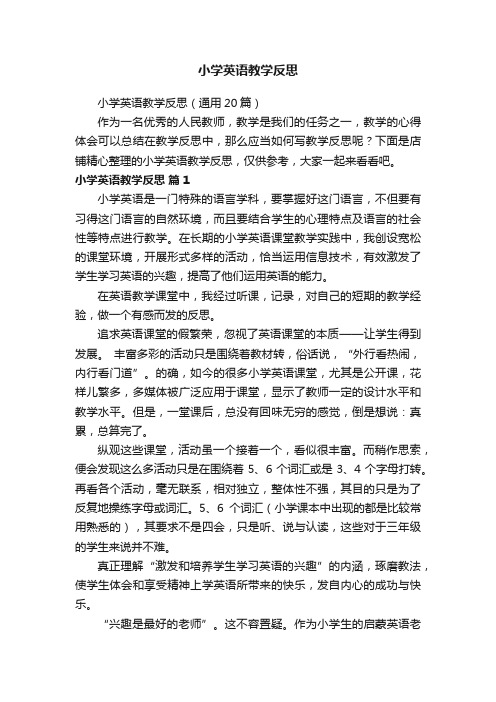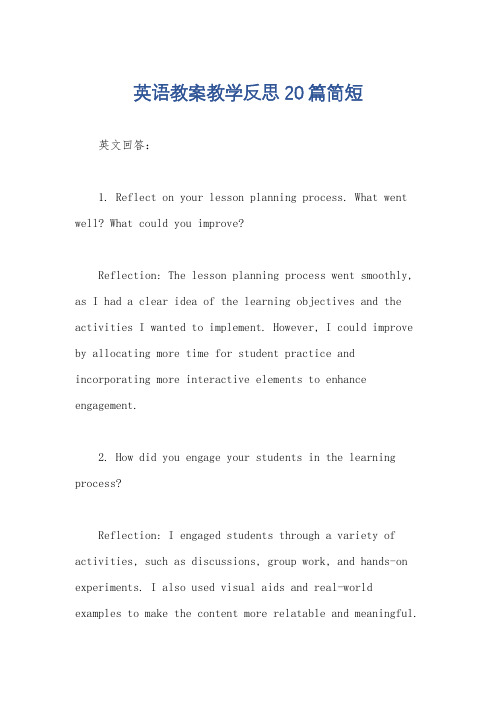英语教学反思(简短20篇)
英语阅读教学反思20篇简短

英语阅读教学反思20篇简短英语阅读教学是英语教学的重要组成部分,对于提高学生的英语水平有着至关重要的作用。
以下是我对英语阅读教学进行的20篇简短反思,希望能为广大教师提供一些启示。
1.反思一:关注学生阅读兴趣的培养,让学生在轻松愉快的氛围中学习英语。
2.反思二:注重词汇教学,帮助学生积累足够的词汇量,为阅读理解打下基础。
3.反思三:培养学生的猜词能力,提高阅读理解水平。
4.反思四:合理设计阅读任务,引导学生积极参与,提高课堂互动性。
5.反思五:关注阅读策略的传授,让学生学会如何高效阅读。
6.反思六:及时反馈学生阅读成果,激发学生的学习积极性。
7.反思七:注重阅读与写作的结合,提高学生的综合语言运用能力。
8.反思八:适当引入课外阅读材料,拓宽学生的知识视野。
9.反思九:关注学生的阅读心理,营造良好的阅读氛围。
10.反思十:利用现代教育技术,提高英语阅读教学的趣味性和实效性。
11.反思十一:注重分层教学,关注不同层次学生的需求。
12.反思十二:培养学生的批判性思维,提高阅读理解深度。
13.反思十三:加强阅读课后的拓展活动,巩固所学知识。
14.反思十四:关注学生阅读过程中的情感体验,提高学习动力。
15.反思十五:结合我国实际,将英语阅读教学与国情教育相结合。
16.反思十六:善于发现学生的阅读亮点,给予表扬和鼓励。
17.反思十七:定期进行阅读测试,了解学生的阅读水平,调整教学策略。
18.反思十八:培养学生的合作精神,开展小组阅读活动。
19.反思十九:关注阅读教学与听说教学的衔接,提高学生的语言综合运用能力。
20.反思二十:不断更新教育观念,跟上时代步伐,提升自身教学水平。
通过以上反思,我们可以看到英语阅读教学的重要性,以及如何在实际教学中提高教学效果。
初一英语教学反思20篇简短

初一英语教学反思20篇简短1. 今日的课堂氛围十分活跃,学生们对英语学习的兴趣明显增强,今后我将继续保持这种课堂氛围,让学生们在快乐中学习。
2. 发现学生们在英语口语方面存在一定问题,今后我将加强口语训练,提高他们的实际交流能力。
3. 今天的教学内容有些偏难,部分学生难以理解,下次我将调整教学内容,使之更符合学生的实际水平。
4. 今日的课堂互动环节效果很好,学生们积极参与,今后我会多设计此类活动,提高他们的课堂参与度。
5. 今日发现部分学生在单词记忆上存在问题,下次我将教授他们一些记忆技巧,帮助他们更好地记忆单词。
6. 今天的阅读理解训练效果不理想,学生们在理解文章时存在困难,下次我将加强阅读训练,提高学生的阅读理解能力。
7. 今日的语法教学部分较为成功,学生们能够较好地掌握和应用所学知识,我会继续保持这种教学方法。
8. 今日的听力训练部分学生表现出色,但也有部分学生需要加强训练,下次我将针对不同层次的学生进行分层教学。
9. 今日的作业批改中发现部分学生存在抄袭现象,下次我将加强作业管理,杜绝抄袭现象的发生。
10. 今日的教学中我注意到了一些细节问题,例如发音和书写规范等,今后我会更加注重这些细节,提高教学质量。
11. 今日的课堂节奏有些快,部分学生无法跟上教学进度,下次我将调整教学节奏,使之更加适应学生。
12. 今日的教学内容有些单调乏味,下次我将尝试引入更多有趣的教学元素,增加学生的学习兴趣。
13. 今日我观察到学生在小组合作方面存在一些不足,他们在团队协作和沟通方面表现得不够默契。
为了改善这一状况,我计划在下次课堂上加强合作学习的指导与训练。
我会教授他们如何合理分工、有效沟通,并培养他们的团队协作意识。
通过更多的实际案例分析和模拟训练,我相信学生们的合作能力会有所提高。
14. 在今天的口语交流课程中,我注意到学生的自信心明显不足。
许多学生在表达自己的观点时犹豫不决,甚至出现紧张和口吃的现象。
英语教学反思(优秀10篇)

英语教学反思(优秀10篇)(经典版)编制人:__________________审核人:__________________审批人:__________________编制单位:__________________编制时间:____年____月____日序言下载提示:该文档是本店铺精心编制而成的,希望大家下载后,能够帮助大家解决实际问题。
文档下载后可定制修改,请根据实际需要进行调整和使用,谢谢!并且,本店铺为大家提供各种类型的经典范文,如合同协议、条据文书、策划方案、总结报告、党团资料、读书笔记、读后感、作文大全、教案资料、其他范文等等,想了解不同范文格式和写法,敬请关注!Download tips: This document is carefully compiled by this editor. I hope that after you download it, it can help you solve practical problems. The document can be customized and modified after downloading, please adjust and use it according to actual needs, thank you!Moreover, our store provides various types of classic sample essays, such as contract agreements, documentary evidence, planning plans, summary reports, party and youth organization materials, reading notes, post reading reflections, essay encyclopedias, lesson plan materials, other sample essays, etc. If you want to learn about different formats and writing methods of sample essays, please stay tuned!英语教学反思(优秀10篇)2、批判成分指驱动思维过程的基础,包括经验、信念、社会政治取向以及教师的目标等,更强调价值观和道德成分,比如教育目标是否合理,教育策略和材料中所隐含的平等与权力问题等。
英语教学反思英文版20篇简短全文剖析

可编辑修改精选全文完整版英语教学反思英文版20篇简短1. Reflection on English TeachingAs an English teacher, I constantly reflect on my teaching methods and strategies to ensure that my students are engaged and learning effectively. I believe that self-reflection is crucial for professional growth and improvement in the classroom.2. The Importance of Reflecting on English Teaching Reflecting on my English teaching allows me to identify areas of strength and areas for improvement. It also helps me to adapt my teaching to meet the diverse needs of my students and create a positive learning environment.3. Challenges in English TeachingTeaching English can be challenging, especially when working with students who have different language abilities and learning styles. Reflecting on these challenges helps me to find creative solutions and improve my teaching practice.4. Adapting to Student NeedsReflecting on my English teaching has taught me the importance of adapting my lessons to meet the individual needs of my students. This may involve modifying my teaching methods, providing additional support, or offering alternative learning materials.5. Engaging Students in English LearningReflecting on my teaching has shown me the value of engaging students in their English learning. By incorporating interactive activities, real-life examples, and technology into my lessons, I can create a more dynamic and enjoyable learning experience for my students.6. Building a Positive Learning EnvironmentReflecting on my English teaching has highlighted the significance of creating a positive and inclusive learning environment. By fostering a supportive classroom culture, I can encourage my students to participate, take risks, and develop their English language skills with confidence.7. Using Feedback to ImproveReflecting on feedback from students, colleagues, andsupervisors has been instrumental in improving my English teaching. By considering and acting on constructive feedback, I can refine my teaching methods and enhance the learning experience for my students.8. Embracing Continuous Professional DevelopmentReflecting on my English teaching has reinforced the importance of continuous professional development. By seeking out new teaching strategies, attending workshops, and staying informed about current trends in English education, I can continue to grow as an effective teacher.9. Balancing Traditional and Innovative Approaches Reflecting on my English teaching has shown me the value of balancing traditional teaching methods with innovative approaches. By incorporating a variety of instructional techniques, I can cater to the diverse learning preferences of my students and keep them engaged in their English learning.10. Celebrating Progress and AchievementsReflecting on my English teaching has reminded me to celebrate the progress and achievements of my students. By acknowledgingtheir efforts and successes, I can motivate them to continue developing their English language skills and build their confidence as learners.11. Overcoming Language BarriersReflecting on my English teaching has taught me how to overcome language barriers in the classroom. By using visual aids, gestures, and simplified language, I can help my students understand and engage with the English content more effectively.12. Fostering a Love for English LearningReflecting on my teaching has reinforced the importance of fostering a love for English learning in my students. By making my lessons enjoyable, relevant, and meaningful, I can inspire my students to become lifelong learners of the English language.13. Cultivating Critical Thinking SkillsReflecting on my English teaching has shown me the value of cultivating critical thinking skills in my students. By encouraging them to analyze, evaluate, and apply their Englishlanguage knowledge, I can help them become more independent and proficient language users.14. Promoting Cultural AwarenessReflecting on my English teaching has highlighted the significance of promoting cultural awareness in the classroom. By incorporating diverse perspectives, literature, and discussions into my lessons, I can help my students appreciate and respect different cultures while improving their English language skills.15. Collaborating with ColleaguesReflecting on my English teaching has emphasized the importance of collaborating with colleagues. By sharing ideas, resources, and best practices, I can enhance my teaching and contribute to a supportive and professional English teaching community.16. Embracing Technology in English TeachingReflecting on my teaching has shown me the value of embracing technology in English education. By integrating digital tools, multimedia resources, and online platforms into my lessons, I can enhance the learning experience and prepare my students forthe digital age.17. Supporting English Language LearnersReflecting on my English teaching has taught me how to better support English language learners. By providing additional language support, scaffolding, and differentiated instruction, I can help my students develop their English language skills at their own pace.18. Encouraging Student AutonomyReflecting on my English teaching has reinforced the importance of encouraging student autonomy. By providing opportunities for self-directed learning, goal setting, and reflection, I can empower my students to take ownership of their English language development.19. Reflecting on Assessment and FeedbackReflecting on my English teaching has highlighted the significance of effective assessment and feedback. By using a variety of assessment methods and providing timely, constructive feedback, I can help my students track their progress and improve their English language skills.20. Looking Ahead in English TeachingReflecting on my teaching has inspired me to look ahead and consider the future of English education. By staying informed about new methodologies, technologies, and trends, I can continue to evolve as an effective English teacher and prepare my students for success in the global community.。
小学英语教学反思

小学英语教学反思小学英语教学反思(通用20篇)作为一名优秀的人民教师,教学是我们的任务之一,教学的心得体会可以总结在教学反思中,那么应当如何写教学反思呢?下面是店铺精心整理的小学英语教学反思,仅供参考,大家一起来看看吧。
小学英语教学反思篇1小学英语是一门特殊的语言学科,要掌握好这门语言,不但要有习得这门语言的自然环境,而且要结合学生的心理特点及语言的社会性等特点进行教学。
在长期的小学英语课堂教学实践中,我创设宽松的课堂环境,开展形式多样的活动,恰当运用信息技术,有效激发了学生学习英语的兴趣,提高了他们运用英语的能力。
在英语教学课堂中,我经过听课,记录,对自己的短期的教学经验,做一个有感而发的反思。
追求英语课堂的假繁荣,忽视了英语课堂的本质——让学生得到发展。
丰富多彩的活动只是围绕着教材转,俗话说,“外行看热闹,内行看门道”。
的确,如今的很多小学英语课堂,尤其是公开课,花样儿繁多,多媒体被广泛应用于课堂,显示了教师一定的设计水平和教学水平。
但是,一堂课后,总没有回味无穷的感觉,倒是想说:真累,总算完了。
纵观这些课堂,活动虽一个接着一个,看似很丰富。
而稍作思索,便会发现这么多活动只是在围绕着5、6个词汇或是3、4个字母打转。
再看各个活动,毫无联系,相对独立,整体性不强,其目的只是为了反复地操练字母或词汇。
5、6个词汇(小学课本中出现的都是比较常用熟悉的),其要求不是四会,只是听、说与认读,这些对于三年级的学生来说并不难。
真正理解“激发和培养学生学习英语的兴趣”的内涵,琢磨教法,使学生体会和享受精神上学英语所带来的快乐,发自内心的成功与快乐。
“兴趣是最好的老师”。
这不容置疑。
作为小学生的启蒙英语老师,我们有责任有义务培养学生的兴趣,这个兴趣应该是具有持久性的、积极向上的特点的。
而物质刺激的方法对任何人都适用,甚至是宠物,其所产生的兴趣只是短暂的,比较低级的。
因此,老师应该从小学生的生理和心理特点出发,精心设计教法,把英语课与活动课相融合,让学生在活动中快快乐乐学英语。
初中英语教学反思20篇

初中英语教学反思20篇初中英语教学反思20篇初中英语教学反思(一):英语对于此刻的学生来说,是一门比较难学的学科。
许多学生都说英语真困难,不愿意学习它。
从而导致他们学习的不太梦想。
最近,有件事情使我感触太深了。
认识到了学生不是学不好,而是存在着有他们不愿意学习的因素。
由于要录实堂课,所以我就把课本中的一节读写课制作成了课件。
这样想的目的主要是避免课堂上的麻烦,节省时光。
但实际上的效果却是我没有想到的。
由于学生第一次接触课件,所以他们感觉十分的新鲜。
上演练课的时候,学生学的异常的认真。
他们进取的、认真的读课文,听我解讲课文中的重点知识。
也在进取的动脑回答思考我所给他们出的问题。
整堂课给我的感觉是学生没有一个在偷懒,都在认真的学习,哪怕是对英语一点兴趣都没有的学生。
自然而然这一节课的效果是出乎我所意料的。
过后,我就在办公室里反思为什么这节课上的这么好?学生为什么对我已经学过的资料表现出这么大的反应?我的最大的感触就是,使用了新鲜的东西,学生感兴趣的方式方法来引导他们学习。
这就意味着,上课要不断的给学生新鲜感,要培养他们对学习英语的兴趣。
不是说兴趣是最好的教师吗?我就是在这一堂课中给学生不一样的学习方法,也能够说是他们比较感兴趣的,抓住他们的注意力。
最大限度的发挥他们本身的潜力,由他们原先的被动学习变为此刻的主动的学习。
正因为他们对本节课充满着兴趣,所以就有很大的乐趣去学习,从而就很顺利地完成了本堂课的教学任务的。
所以,在今后的教学中,要不断的更改教学方式,要从根本培养起学生学习的兴趣。
仅有兴趣才是最好的教师。
好的先生不是教书,不是教学生,而是教学生学。
初中英语教学反思(二):简短的初中英语教学反思新课改倡导全人教育,强调课程要促进每个学生身心的健康发展,培养学生良好的品质和终身学习的潜力,新课改提倡交流与合作、自主创新学习,课程改革的成败关键在于教师,教师是课程改革的实施者。
下方简单地回顾、反思两年多来的英语教学工作。
英语教学反思20篇简短

英语教学反思20篇简短-CAL-FENGHAI-(2020YEAR-YICAI)_JINGBIAN英语教学反思20篇简短小学英语课教学反思(一):小学英语重在真实自然,贴近学生的生活。
教材中选用的单词和句式,一般都是社会中最常见,最基础的,但由于种种原因,有些学生还是不能很好的掌握他们的语音、音调。
尤其是一些较难读的单词。
学生刚开始接触英语时,就凭一时的兴趣学习。
他们对课堂上动手、游戏的部分十分感兴趣,而对英语基本技能(单词及语音的模仿、记忆等)一开始还有板有眼的,时光长了,加上有些单词比较难读,他们就感觉索然无味,于是就不专心听讲。
这样,他们既使在课堂上记住了一些语音知识,下了课就忘得一干二净。
随着学习资料的不断增多,这部分学生学习上的问题更加突出。
之后,既使他们认识到学习英语的重要性,但学习吃力,就自信心大减。
最后甚至有不再要上英语课的想法。
有些学生由于内向,孤僻的性格。
他们不愿开口,不善交往;而开口少,与他人接触少,往往模仿潜力也差,这就使及他们更不愿参与各种英语练习活动,内向的性格使他们回避与别人交往,碰到问题常常不向同学或老师请教,在课堂上害怕表现不佳,有损自我在老师和同学心目中的形象,降低自我价值。
因此,他们缺乏自我表现的习惯和勇气。
就连不得不参加的“one by one”都是极低的声音,试图不引起别人的注意。
具有这种性格倾向的学生,不仅仅学习上的困难无法解决,而且语言知识也不能到达最大限度的再现。
进行“pair work”时,他们总是不投入,缺乏跟同学的合作精神。
目前,大部分学生每周只有三节课能接触到英语,加之班额较大,既使在英语课堂上也只有少数优秀的、用心的学生想参与语言实践活动,一堂课上单词、对话或课文等教学资料一项接一项,对于学习潜力不强的学生来说犹如看电影似的过了一遍,根本掌握不了。
同时,课后没有很好的语言环境,学生语音掌握更加困难。
由于不明白英语的基本音标,有些学生应对已遗忘的单音节词不知所措,对他们来说,英语单词实在难记,这使英语课成了死记硬背的代名词。
英语教案教学反思20篇简短

英语教案教学反思20篇简短英文回答:1. Reflect on your lesson planning process. What went well? What could you improve?Reflection: The lesson planning process went smoothly, as I had a clear idea of the learning objectives and the activities I wanted to implement. However, I could improve by allocating more time for student practice and incorporating more interactive elements to enhance engagement.2. How did you engage your students in the learning process?Reflection: I engaged students through a variety of activities, such as discussions, group work, and hands-on experiments. I also used visual aids and real-world examples to make the content more relatable and meaningful.3. How did you differentiate instruction to meet the needs of all learners?Reflection: I differentiated instruction by providing students with choice in activities, offering tiered assignments, and providing extra support for struggling learners through small group instruction.4. What challenges did you face during the lesson? How did you overcome them?Reflection: One challenge was managing the pace of the lesson, as some students progressed faster than others. I overcame this by providing extension activities for early finishers and re-teaching concepts for students who needed more time.5. What did you learn from this teaching experience?Reflection: I learned the importance of flexibility and adaptability in teaching. I also realized the power ofcollaboration, as I sought input from colleagues and students to enhance the lesson content and delivery.6. How will you apply what you learned to your future teaching practice?Reflection: I will apply the lessons learned from this experience by incorporating more differentiation strategies, using a variety of engagement techniques, and seeking feedback from students and colleagues to continuously improve my teaching practice.7. What are your overall thoughts on the lesson andyour teaching performance?Reflection: Overall, I am satisfied with the lesson and my teaching performance. I believe the lesson was effective in meeting the learning objectives and engaging students. However, I recognize areas for improvement and am committed to ongoing professional development to enhance my teaching abilities.8. How did the lesson align with your teaching philosophy?Reflection: The lesson aligned with my teaching philosophy, which emphasizes student-centered learning, hands-on experiences, and differentiation to meet the diverse needs of learners. I believe this lesson provided students with opportunities to actively engage with the content and develop their critical thinking skills.9. What specific aspects of the lesson wereparticularly successful?Reflection: The hands-on experiment was particularly successful, as it allowed students to apply the concepts they had learned in a practical way. The use of real-world examples also resonated with students and helped them make connections between the classroom and their daily lives.10. What changes would you make to the lesson if you were to teach it again?Reflection: If I were to teach the lesson again, I would allocate more time for group discussions to allow students to share their ideas and perspectives. I would also incorporate more opportunities for student self-assessment to foster their metacognitive skills.中文回答:1. 反思你的备课过程。
- 1、下载文档前请自行甄别文档内容的完整性,平台不提供额外的编辑、内容补充、找答案等附加服务。
- 2、"仅部分预览"的文档,不可在线预览部分如存在完整性等问题,可反馈申请退款(可完整预览的文档不适用该条件!)。
- 3、如文档侵犯您的权益,请联系客服反馈,我们会尽快为您处理(人工客服工作时间:9:00-18:30)。
教学反思英语20篇简短
以下是20篇简短的英语学科的教学反思,使用中文书写:
1.今天的英语课进行得很顺利。
学生们积极参与讨论,并对课堂内容有良好的理解。
2.我注意到一些学生在发音上遇到了困难,所以我将在以后的课程中更加注重音标的活动。
3.使用视觉和生活实例帮助学生更容易地理解概念。
4.我应该提供更多的小组合作和小组活动的机会,以增强学生之间的互动。
5.使用多媒体资源让学生参与其中,使课堂更有趣。
6.我需要给出更清晰的指示,并在进行下一个活动之前检查学生是否理解。
7.一些学生在课堂上似乎分心,所以我将增加更多的互动游戏,让他们保持专注。
8.鼓励学生在课堂上用英语进行交流,帮助他们提高口语表达能力。
9.对于较弱的学生,我会提供额外的辅导和练习,帮助他们更好地掌握课程内容。
10.将课堂重点整理成概括性的笔记,方便学生回顾和复习。
11.通过反馈问卷了解学生对课程的反应,并根据反馈做出相应的调整。
12.利用课堂时间进行个别辅导,帮助学生解决他们的疑惑和困
难。
13.引导学生自主学习,鼓励他们提出问题和参与讨论。
14.在教学中注重培养学生的阅读理解能力,提供相关的练习和材料。
15.利用多种教学方法和资源,满足不同学生的学习需求和兴趣。
16.鼓励学生使用英语进行写作练习,帮助他们提高写作能力。
17.定期组织课外活动,拓宽学生的英语语言环境和实践机会。
18.鼓励学生自主学习英语的习惯,提供相关的学习资源和建议。
19.在课堂上给予学生积极的鼓励和表扬,增强他们的学习动力。
20.持续与家长保持沟通,及时反馈学生的学习进展和表现,共同关注学生的学习情况。
